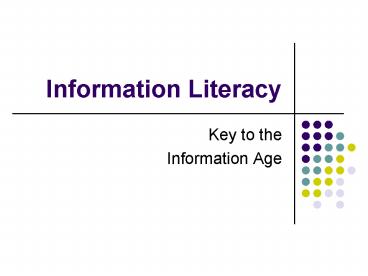Information Literacy - PowerPoint PPT Presentation
1 / 26
Title:
Information Literacy
Description:
P. S. & Senn, J. A. (1998). ' Information literacy: Educating children for ... ritin', and rithmetic are the three arts: dance, music, and the visual arts. ... – PowerPoint PPT presentation
Number of Views:129
Avg rating:3.0/5.0
Title: Information Literacy
1
Information Literacy
- Key to the
- Information Age
2
A new definition of Education
- "In this next century, an 'educated' graduate
will no longer be defined as one who has absorbed
a certain body of factual information, but as one
who knows how to find, evaluate, and apply needed
information."
Breivik. P. S. Senn, J. A. (1998). "Information
literacy Educating children for the 21st
century." (2nd ed.). Washington, DC National
Education Association. p.2
3
According to the research
- Information literacy is a process. Information
literacy skills must be taught in the context of
the overall process. - To be successful, information literacy skills
instruction must be integrated with the
curriculum and reinforced both within and outside
of the educational setting. - Information literacy skills are vital to future
success.
ERIC Digest, http//www.ericdigests.org/1999-4/inf
ormation.htm
4
What IS Information Literacy?
But
5
Information Literacy is
- A Desired Result of education
- A progressive continuum of learned skills
- An umbrella term covering several literacies
- The defining paradigm for modern education
6
U.S.A. Definition
Information Literacy is defined as the ability
to know when there is a need for information, and
to be able to identify, locate, evaluate, and
effectively use that information for the issue or
problem at hand. -- National Forum on
Information Literacy
7
International Definition
Information Literacy encompasses knowledge of
ones information concerns and needs, and the
ability to identify, locate, evaluate, organize,
and effectively create, use and communicate
information to address issues or problems at
hand it is a prerequisite for participating in
the Information Society, and is part of the basic
human right of life long learning. -- The Prague
Declaration, Sept. 2003
8
Information Literacy includes
- Basic Literacy
- Library Literacy
- Media Literacy
- Technology Literacy
- Visual Literacy
9
A visual model
10
Basic Literacy
- Reading and Writing
- Speaking and Listening
- Counting and Calculating
- Perceiving and Drawing
11
Library Literacy
- Types of Materials
- Dewey system
- Catalog and Indexes
- Research Process
12
Media Literacy
- Types of Media
- Broadcast
- Online
- Purpose of Presentation
- Inform
- Entertain
- Persuade
13
Technology Literacy
- Tools
- Hardware
- Software
- Ethics Etiquette
- Production
- Presentation
- Online
14
Visual Literacy
If students arent taught the language of sound
and images, shouldnt they be considered as
illiterate as if they left college without being
able to read and write? -- George Lucas,
Edutopia, September 2004
15
Sensory Literacy
- Educators must acknowledge that there are now
two parallel tracks for learning, both equally
critical to understand. Running alongside the
traditional 3Rs readin, ritin, and
rithmetic are the three arts dance, music,
and the visual arts. To ignore this new language
of media and sensory literacy is to shortchange
in a crucial way the education of our children - -- Leonard Shlain, Edutopia, Oct. 2005
16
A visual model
17
Continuum of Understanding
Nathan ShedroffExperience Design
18
National Standards Information Power
- The student who is information literate
19
National Standards Information Power
- 1. accesses information efficiently and
effectively - 2. evaluates information critically and
competently - 3. uses information accurately and creatively
20
National Standards Information Power
- The student who is an independent learner is
information literate and
21
National Standards Information Power
- 4. pursues information related to personal
interests - 5. appreciates literature and other creative
expressions of information - 6. strives for excellence in information
seeking and knowledge generation
22
National Standards Information Power
- The student who contributes positively to the
learning community and to society is information
literate and
23
National Standards Information Power
- 7. recognizes the importance of information to
a democratic society - 8. practices ethical behavior in regard to
information and information technology - 9. participates effectively in groups to pursue
and generate information
24
The Librarians role
- Helper A source of information
- Guide A source of information resources
- Trainer An instructor in using information
resources - Teacher A guide to higher order thinking
- Advocate An activist in promoting information
literacy skills - Visionary A leader in educational excellence
25
The challenge
- Learn about Information Literacy
- Work with teachers to integrate Information
Literacy skills into their curriculum - Provide tools in your library
- Constantly improve your own skills
26
Looking ahead
- Creating schools for the twenty-first century
requires less time looking in the rearview mirror
and more vision anticipating the road ahead. --
George Lucas, http//edutopia.org, 7/1/2003































